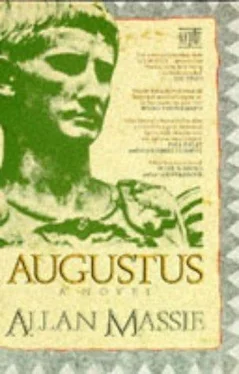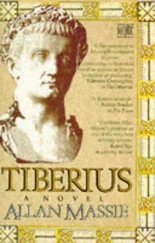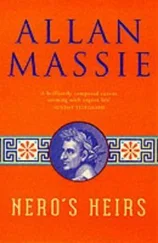Allan Massie - Augustus
Здесь есть возможность читать онлайн «Allan Massie - Augustus» весь текст электронной книги совершенно бесплатно (целиком полную версию без сокращений). В некоторых случаях можно слушать аудио, скачать через торрент в формате fb2 и присутствует краткое содержание. Жанр: Исторические приключения, на английском языке. Описание произведения, (предисловие) а так же отзывы посетителей доступны на портале библиотеки ЛибКат.
- Название:Augustus
- Автор:
- Жанр:
- Год:неизвестен
- ISBN:нет данных
- Рейтинг книги:4 / 5. Голосов: 1
-
Избранное:Добавить в избранное
- Отзывы:
-
Ваша оценка:
- 80
- 1
- 2
- 3
- 4
- 5
Augustus: краткое содержание, описание и аннотация
Предлагаем к чтению аннотацию, описание, краткое содержание или предисловие (зависит от того, что написал сам автор книги «Augustus»). Если вы не нашли необходимую информацию о книге — напишите в комментариях, мы постараемся отыскать её.
Augustus — читать онлайн бесплатно полную книгу (весь текст) целиком
Ниже представлен текст книги, разбитый по страницам. Система сохранения места последней прочитанной страницы, позволяет с удобством читать онлайн бесплатно книгу «Augustus», без необходимости каждый раз заново искать на чём Вы остановились. Поставьте закладку, и сможете в любой момент перейти на страницу, на которой закончили чтение.
Интервал:
Закладка:
I envied him his love for the idea of the Republic; he was infatuated with virtue. (But, my sons, you know the root of that verb 'to infatuate', don't you? You realize I have chosen it with the utmost precision to describe its effect on this man of genius.) He had beautiful manners too. Having discussed the matter with Maecenas, I went to visit Cicero taking with me humble and homely presents – a pot of honey from the Alban hills, a caciocavallo cheese, the first (very early, for it was a marvellous benign spring) wood strawberries from Nemi. He received me with a dignity that did honour to us both.
He began by speaking of Caesar. 'You must not think I did not respect him,' he said, 'even love him. Who could fail to admire his abilities? What a power of reasoning, what a memory, what lucidity, what literary skill, what accuracy, profundity of thought and energy! His conquest of Gaul! Even though, as you will understand, I cannot think of it in its consequences as other than disastrous for the Republic, nevertheless, what an achievement! His genius was great, well-nigh unparalleled of its type; yet, my boy, and I say this with tears in my eyes, consider the consequence of his illustrious career: he brought this free city, which we both love – do we not? – to a habit of slavery. That is why I opposed him. That is why I welcomed his death. It is painful for me to say this; it is painful for you to hear it. Yet I must be honest if we are to work together, as I hope we may.' 'It is my hope too, sir,' I said.
'These gifts you have brought me, so aptly and significantly chosen, they give me assurance that that hope may not be vain. There is measure and restraint in your choice; a just severity of judgement.'
I said: 'They are nothing. I merely hoped they might be pleasing to the Father of our Country, who saved Rome from the mad wolf Catiline.'
His manner, which had been public, ornate, rhetorical and insincere, changed.
'Ah,' he said, 'you know about that. I can never believe they teach any history now. My own sons and my nephew would have known nothing if I had not instructed them myself. And indeed you see truly what Catiline was… But what else is Antony?'
I was amazed at his audacity, for I had been accustomed to hear men mock his timidity. I had not known before how some men become bolder as their future shortens.
'Do you know what Rome is?' he said. 'Ah, how could you, child? But come.'
He took me by the sleeve and led me over to where we could look down on the city. The sky was of the most intense blue; the temples on the Capitol glittered. Below the hill rose the hum of the city, a constant movement, a coming and going, a jostling animation; law courts were babbling, baths teeming, libraries attended, cook-shops and taverns sizzling. We withdrew into the cool of the atrium.
'It is a city of free men,' Cicero said, 'with liberty of discussion and debate, where none legally wears arms or armour; a city of noble equals; and that mad dog, whom I shall not dignify with Catiline's name of wolf, that drunken pirate, threatens to stop our mouths with the swords of his legionaries.' 'I have legions too, sir.' The first smile lit up his face; he chuckled.
'Of course you have, dear boy. That's why you are here, child. The question is, what will you do with them?' 'My legions are at the service of the Republic,' I said. He let a long silence of sceptical memories fill the air.
'But,' I continued, 'what are the intentions of the Republic towards me?'
'I am not sure,' he said, 'that just at the moment the Republic can be said to have any intentions. It is as bereft of will as it is of legions. That, dear boy, is the crux of the matter.'
When Antony promised me safety if I delivered my legions to him, there was mockery in his voice. There was an even harsher note: contempt. He believed I would indeed be ready to buy safety. 'You, boy,' he would say, 'with your banker's blood, who owe everything to a name…' Such an assumption on his part hardly caused me to respect his intelligence: did he truly fail to realize that I too had let the dice fly high when I chose to accept Julius' legacy and acknowledged Maco's salute at Brindisi?
Cicero praised me in the Senate. His words would have overwhelmed me if my vanity had approached his own. Agrippa was hugely impressed. He repeated over and over again that we had really arrived: 'I don't see that they can now deny you legitimate authority. Not after such advocacy.' Maecenas I saw smirking. 'You don't agree, do you?' I said. 'Oh,' he said, 'who am I to speak? Remember I am not a true Roman. I don't understand your Senates and Assemblies. My ancestors were Kings in Etruria. So it is hard for me to estimate the effect of oratory on a body like the Senate. But we have a saying in my family: beware the man who speaks well of you. Besides, haven't you heard the story that's going about? Someone said to Cicero, "Why on earth do you praise that young man?" The old boy looked over his shoulder to see who might overhear, and replied, "The young man must be praised." "Must be?" asks his chum. "Must be," says Cicero, "he must be praised, decorated and… disposed of…" What we mustn't forget, my dears, is that Cicero was cheating serpents before our daddies were weaned.' I looked at Maecenas. 'We must never let Cicero suspect that we guess what he has in mind. He is our dearest friend and essential ally.'
It was a spring of the utmost delicacy. The wild weather of the March of Julius' murder was scattered by a sun that promised more than we could find time to enjoy. I had got myself an army, but hesitated whether to use it or disband it for the moment. Antony returned to Rome about 20 May, bringing with him a bodyguard of thugs ready to control any vote in the popular assembly. With money that was rightfully mine he bought the alliance of Cicero's son-in-law Dolabella. At the beginning of June he staged a plebiscite to prolong his own provincial command for three years.
We met again in a house that had once belonged to Pompey; whether he or Antony was responsible for its vulgarity, I could not tell. But I had time enough to study it, for Antony had the insolence to keep me waiting. No doubt he thought to disturb me. When he at last granted me an interview his insolence continued. He again absolutely refused to disgorge Julius' money.
I accepted his insolence in silence. Do not, my children, ever underestimate the value of silence. It disconcerts bluster and distorts judgement.
When I left his presence I let it be known that I would pay all Julius' legacies; 'If it costs me my last penny,' I asserted. I wrote to my friends in the legions in Macedonia complaining that Antony was refusing to avenge Caesar.
This was not strictly true, for by midsummer Antony was actually besieging Decimus Brutus in Mutina. This disturbed Agrippa. 'It seems to me wrong that we're not working with Antony,' he kept saying. 'I tell you our centurions don't understand what you're up to. They don't like it. They joined us to avenge Caesar and here you are fucking about with the Senate and that old woman Cicero.'
'Run away and practise your sword-play, ducky,' Maecenas said. 'We do have heads on our shoulders. We're not just blundering about.'
'Well,' Agrippa glowered at me, 'that's what it fucking well looks like. If you've got a plan, perhaps you'd be kind enough to tell me what it is?' I thought about that.
'There you go again,' he said. 'You just sit there like a little owl, and let him make fun of me. You don't tell me anything, but it's me as has to go out and find you soldiers, and then try to keep 'em happy. But they're not happy, they're bleeding not. So what's your naming plan?'
'I don't have one,' I said, 'not the sort of plan you could write down.'
Читать дальшеИнтервал:
Закладка:
Похожие книги на «Augustus»
Представляем Вашему вниманию похожие книги на «Augustus» списком для выбора. Мы отобрали схожую по названию и смыслу литературу в надежде предоставить читателям больше вариантов отыскать новые, интересные, ещё непрочитанные произведения.
Обсуждение, отзывы о книге «Augustus» и просто собственные мнения читателей. Оставьте ваши комментарии, напишите, что Вы думаете о произведении, его смысле или главных героях. Укажите что конкретно понравилось, а что нет, и почему Вы так считаете.












